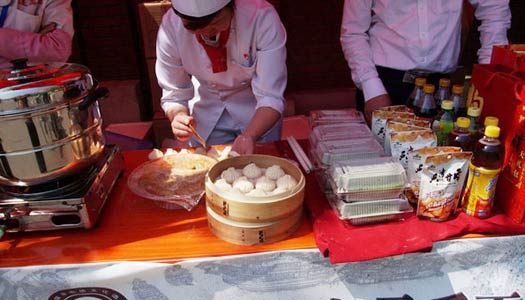
Sowing the seeds of success in Tanzania
Updated: 2013-03-26 08:00The center is a project set up under the aegis of the China-Africa Cooperation Summit held in Beijing in 2006, and it is one of 10 such units in Africa. The 62-hectare project was set up in October 2009 by the Chongqing Sino-Tanzania Agriculture Development Co with a $6 million grant provided by the Chinese government.
During the project's handover ceremony in 2011, Tanzanian President Jakaya Mrisho Kikwete expressed the view that it would be a vital cog in Tanzania's agricultural development plans.
The center mainly focuses on research and training for Tanzanian farmers, especially in Chinese agricultural techniques like advanced seed technology.
The center has set up a two-hectare experimental field, a seven-hectare exhibition field, and a chicken farm with a variety of farm irrigation facilities.
It currently has 11 agricultural experts from China, specializing in growing rice and corn, vegetables and poultry cultivation. More than 300 local farmers receive systematic training courses at the center every year.
Chinese experts from the center have already managed to raise the average yields of hybrid rice to between nine and 12 tons per hectare, a fourfold increase of local rice yields.
The hybrid rice seeds introduced by the Chinese center is expected to help Tanzanian farmers to produce enough rice for domestic consumption and export, says Christopher Chiza, the Tanzanian minister for Agriculture, Food Security and Cooperatives.
"We are inputting the modern agricultural knowledge to Tanzanian farmers so that they can achieve their goal of independent agricultural development," says Chen Hualin, a professor from the Chongqing Academy of Agricultural Sciences and currently a member of the agricultural center.
Opportunities
About 40 km from the center is another Chinese agricultural investment that is a big draw in Tanzania. It is a sisal farm operated by China State Farms Agribusiness Corp Tanzanian subsidiary.
Sisal, a plant that yields a stiff fiber, is widely used in the construction and manufacturing industry for padding, especially in mattresses and handcrafts. Tanzania has been the leading producer of sisal for several decades.
The sisal industry was the largest foreign exchange earner and also the largest employer in Tanzania in the 1960s and 1970s. Its price has declined sharply since then due to increasing competition in the international market and synthetic substitutes. Privatization of the State-owned plantations further exacerbated the situation as competition intensified.
When the Chinese company entered the African country in the late 1990s, most local sisal farms had become wastelands. However, the Chinese experts soon realized that sisal had irreplaceable advantages due to its strong ductility and fireproof qualities.
"We believe that the global demand for sisal will return. Operating a sisal farm in Tanzania also helps conserve land in China for other domestic crops," says Wang Lusheng, chief engineer of the Chinese company's Tanzania subsidiary.
The sisal farm in the Morogoro region is spread over 6,900 hectares, with a plantation area of 1,400 hectares and sisal fiber output of around 2,000 metric tons.
After 12 years of development, the farm is now poised for peak production. From this year, the company will add 300 hectares of plantation area every year, so that the sisal plantation covers 3,000 hectares by 2020 with an annual output of 10,000 metric tons.
"The soil is fertile, but cultivation called for modern technology and management methods. We have rich experience in sisal planting and processing from our operations in Guangdong and Guangxi, and can bring our best technicians here. Our farm is among the largest three sisal estates in Tanzania," Wang says.
Sisal prices have more than doubled from the $600 per ton 10 years ago, with demand rising steadily in recently years. "This has proved beneficial for international business," he says.
Currently nine Chinese professionals work at the sisal farm, which employs 700 people permanently and 300 on a temporary basis.
"The monthly salary I receive from the farm is more than the earnings I made in a whole year earlier on," says Mobimba Toraboni, 38-year-old, who has been working at the Chinese sisal farm for about two years and now lives with his wife and two children at the farm.
Before joining the farm, Toraboni was planting sisal at home. The family's income was totally dependent on the natural environment, but those days have gone. "Joining the farm was definitely a life-changing decision," he says.
- BYD exports three electric cars to Thailand
- Grid gets first jolt of residential solar power
- US now largest buyer of China's exports
- China's outbound M&As on the rise
- Tobacco control may entail price, tax rises
- Quanzhou becomes pilot financial reform zone
- New automobiles shine at Geneva Motor Show
- World's longest high-speed rail 'on track'
- Jiugui Liquor involved in plasticizer scandal again
- Accident reignites school bus safety concerns
- China to revise labor law
- Trademark registration under scrutiny
- Dinner ban takes toll on liquor firms
- CIC tables bid for London's Chiswick Park
- Property buyers eye overseas market
- Call for law to protect personal information
- China to cut train ticket prices
- Christmas business
- Solar industry to get jolt from new policies
- KFC chicken under spotlight














